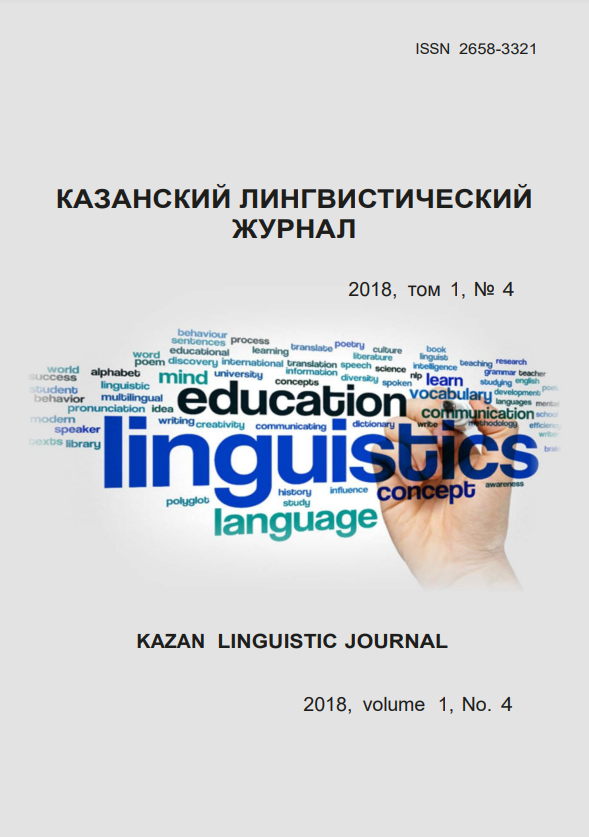Linguadidactic capabilities of education informatization facilities
Keywords:
education informatization facilities, linguadidactic capabilities, multimedia, hypertext, hypermedia, telecommunications, virtual realityAbstract
The development of complex informatization and intensification of foreign language training without regard to education level and specialization depends on the full-fledged realization of linguadidactic capabilities of education informatization facilities. Some of the information and communications facilities (ICT) facilities are depicted in the works of foreign and Russian scientists. Previous studies fairly indicate that multimedia, hypertext, hypermedia, telecommunications, virtual reality have unique functionalities; and, they, as technical education informatization facilities, are highly perspective from the linguodidactical point of view. However, to the author’s best knowledge, the linguodidactical capabilities of these technical facilities have been scarcely investigated systematically. The purpose of this very manuscript is to formulate the linguadidactic capabilities of education informatization facilities regard to functionalities of multimedia, hypertext, hypermedia, telecommunications, virtual reality, to disclose the linguadidactic potential of technical facilities and to show interdependence between ICT and speech communication. As the result of investigation, the linguadidactic analysis of every technical education informatization facility, taking individually, are presented. The contemprorary approaches to the essence interpretation of individual technical education informatization facilities, their capabilities, advantages, disadvantages and the prospects of development are revealed. Their linguadidactic potential in modelling of foreign language speech communication situations and interconnected speech activities training are pointed out. In conclusion, eleven linquadidactic capabilities of education informatization facilities, creating the necessary prerequisites for foreign language training enhancement are presented.
References
Литература
Горбунова Т.С., Фахрутдинова А.В. Применение аудиовизуальных средств обучения иностранному языку в неязыковом вузе // Учёные записки Казанской государственной академии ветеринарной медицины им. Н.Э. Баумана. Казань, 2014. Т. 218. № 2. С. 64–69.
Григорьев С.Г., Гриншкун В.В. Информатизация образования. Фундаментальные основы. Учебник для педагогических вузов и системы повышения квалификации педагогов. М., 2005. 231 с.
Гриншкун В.В. Григорьев С.Г. Образовательные электронные издания и ресурсы. // Учебно-методическое пособие для студентов педагогических вузов и слушателей системы повышения квалификации работников образования. Курск: КГУ, Москва: МГПУ. 98 с.
Есенина Н.Е. Лингводидактический потенциал средств информационных и коммуникационных технологий // Современная коммуникативистика. М: Научно-издательский центр «Инфра-М». 2016. №6 (25). С. 41–49.
Костикова Л.П. Использование виртуальной обучающей среды MOODLE для формирования межкультурной компетенции студентов
//Инновации на основе информационных и коммуникационных технологийю.
№ 1. 2014. С. 82–84.
Роберт И.В. Развитие дидактики в условиях информатизации образования //Педагогика: научно-теоретический журнал Российской академии образования: издается с июля 1937 /ред. Р.С. Бозиев. № 9. 2012. С. 25–6.
Роберт И.В. Теория и методика информатизации образования (психолого-педагогический и технологический аспекты). М.: БИНОМ. Лаборатория знаний, 2014. 398 с.
Behúnová A., Ádám N., Pietriková E. Mobile support for learning of foreign languages // 2016 International Conference on Emerging eLearning Technologies and Applications (ICETA). Vysoke Tatry, 2016. Pp. 15–21.
Carrio-Pastor M.L. Technology implementation in second language teaching and translation studies: New tools, new approaches. New Frontiers in Translation Studies. Springer Singapore. 2016. // URL: http://www.springer.com/gp/ book/9789811005718 (дата обращения: 17.11.2017)
Yesenina N.Y. Application of ICT for foreign language educational material memorizing by engineering students. Research result: Pedagogic and psychology of education. 3(2). Pp 16–20.
References
Behúnová, A., Ádám, N., Pietriková, E. (2016). Mobile support for learning of foreign languages. 2016 International Conference on Emerging eLearning Technologies and Applications (ICETA). Vysoke Tatry, pp. 15–21. (In English).
Carrio-Pastor, M.L. (2016).Technology implementation in second language teaching and translation studies: New tools, new approaches. New Frontiers in Translation Studies. Springer Singapore. //URL: http://www.springer.com/gp/ book/9789811005718 (accessed: 17.11.2017). (In English).
Gorbunova, T.S., Fahrutdinova, A.V. (2014). Primenenie audiovizual'nyh sredstv obucheniya inostrannomu yazyku v neyazykovom vuze. [The use of audiovisual means of foreign language teaching in extra-linguistic high educational institution] // Uchyonye zapiski Kazanskoj gosudarstvennoj akademii veterinarnoj mediciny im. N. EH. Baumana. Kazan. T. 218. № 2. Pp. 64–69. (In Russian).
Grigor'ev, S.G., Grinshkun V.V. (2005). Informatizaciya obrazovaniya. Fundamental'nye osnovy. [Education Informatization. The Fundamental Foundations]. Uchebnik dlya pedagogicheskih vuzov i sistemy povysheniya kvalifikacii pedagogov. M., 231 p. (In Russain).
Grinshkun, V.V. Grigor'ev, S.G. Obrazovatel'nye ehlektronnye izdaniya i resursy. [Educational electronic issues and resources] // Uchebno-metodicheskoe posobie dlya studentov pedagogicheskih vuzov i slushatelej sistemy povysheniya kvalifikacii rabotnikov obrazovaniya. Kursk: KGU, Moskva: MGPU, 98 p. (In Russian).
Kostikova, L.P. (2014). Ispol'zovanie virtual'noj obuchayushchej sredy MOODLE dlya formirovaniya mezhkul'turnoj kompetencii studentov [The using of virtual educative medium MOODLE for forming of students’ intercultural competence]. //Innovacii na osnove informacionnyh i kommunikacionnyh tekhnologijyu. M. № 1. Pp. 82–84. (In Russian).
Robert, I.V. (2012). Razvitie didaktiki v usloviyah informatizacii obrazovaniya [The development of didactics within education informatization] // Pedagogika: nauchno-teoreticheskij zhurnal Rossijskoj akademii obrazovaniya. M. № 9. Pp. 25–6. (In Russian).
Robert, I.V. (2014). Teoriya i metodika informatizacii obrazovaniya (psiholo-go-pedagogicheskij i tekhnologicheskij aspekty) [The theory and methodology of education informatization (pcychological and technological aspects)]. M.: BINOM. Laboratoriya znanij, 398 p. (In Russian).
Yesenina, N. Y. (2017). Application of ICT for foreign language educational material memorizing by engineering students. Research result: Pedagogic and psychology of education. 3(2). Pp 16–20. (In English).
Yesenina, N. Ye. (2016). Lingvodidakticheskij potencial sredstv informacionnyh i kommunikacionnyh tekhnologij [Linquadidactic potential of Informational and Communicational Facilities] //Sovremennaya kommunikativistika. M: Nauchno-izdatel'skij centr «Infra-M». №6 (25). Pp. 41–49. (In Russian).






